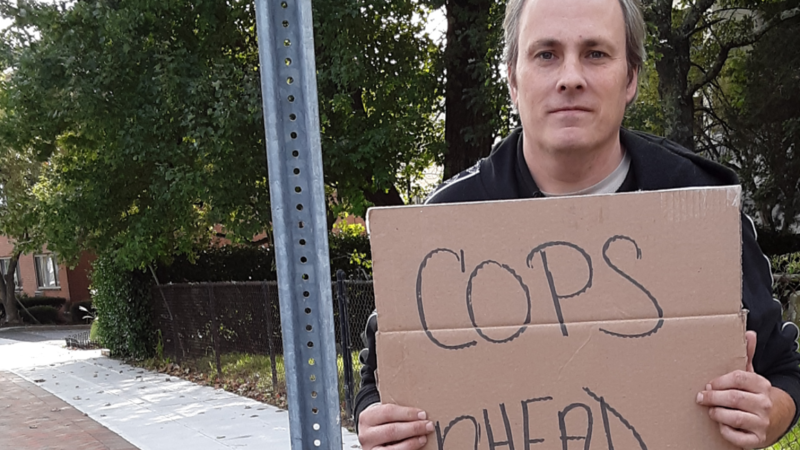Federal Appeals Court Upholds First Amendment Right To Warn Drivers of Police Ahead
Michael Friend was arrested in 2018 for holding a sign that read "Cops Ahead" near a police checkpoint. That arrest violated his First and Fourth Amendment rights, a federal appeals court has ruled.

A federal appeals court ruled that a Connecticut man's First Amendment rights were violated when police arrested him for holding a sign warning drivers of police activity ahead.
The U.S. Court of Appeals for the 2nd Circuit reversed a lower court decision and held that a police officer in Stamford, Connecticut, violated Michael Friend's First Amendment rights and had no probable cause to arrest him for standing on a public sidewalk and holding a sign that read "Cops Ahead."
Friend was standing on a sidewalk near a Stamford police checkpoint on April 12, 2018, holding a "Cops Ahead" sign when Sgt. Richard Gasparino approached Friend, took his sign, and threatened to arrest him. Friend instead made a larger sign and moved to a different spot. Gasparino then handcuffed and arrested Friend, who was charged with misdemeanor interference and held on a $25,000 bail. Prosecutors later dropped the charge.
Friend, represented by the Connecticut chapter of the American Civil Liberties Union (ACLU), filed a civil rights lawsuit, arguing that Gasparino's seizure of his signs and his arrest violated Friend's First and Fourth Amendment rights.
A U.S. district court dismissed Friend's suit in 2020, finding that: Friend's sign "did not discuss a topic or express his opinion on it;" that Gasparino had a compelling government interest in stopping Friend from spoiling the police sting; and that Gasparino had probable cause to arrest Friend for returning after he told him not to.
The 2nd Circuit ruled that the district court erred in all three of those findings, citing the 1987 Supreme Court ruling in Houston v. Hill: "The freedom of individuals verbally to oppose or challenge police action without thereby risking arrest is one of the principal characteristics by which we distinguish a free nation from a police state."
The case will now return to the district court to consider whether Gasparino is entitled to qualified immunity from Friend's claims.
In a press release, Elana Bildner, senior staff attorney for the ACLU Foundation of Connecticut and an attorney on the case, called the 2nd Circuit ruling "a solid affirmation of the fact that people have the right to protest the police."
"When Michael Friend held up a sign on a Stamford sidewalk to alert people to police activity, he was well within his First Amendment rights, and Stamford police never should have arrested him," Bildner said. "This decision is good news for protesters' rights and should serve as a reminder to all police in Connecticut that they cannot and should not silence speech like Mr. Friend's."
This is not the only sign-related First Amendment case that Stamford has generated in recent years. In 2018, one of Friend's friends, Michael Picard, was arrested by Stamford police for holding a sign outside of the police station that read "Fuck Free Speech —Stamford PD."
Courts have repeatedly ruled that warning drivers of upcoming police by flashing one's headlights is a form of expression and protected under the First Amendment.

Show Comments (43)